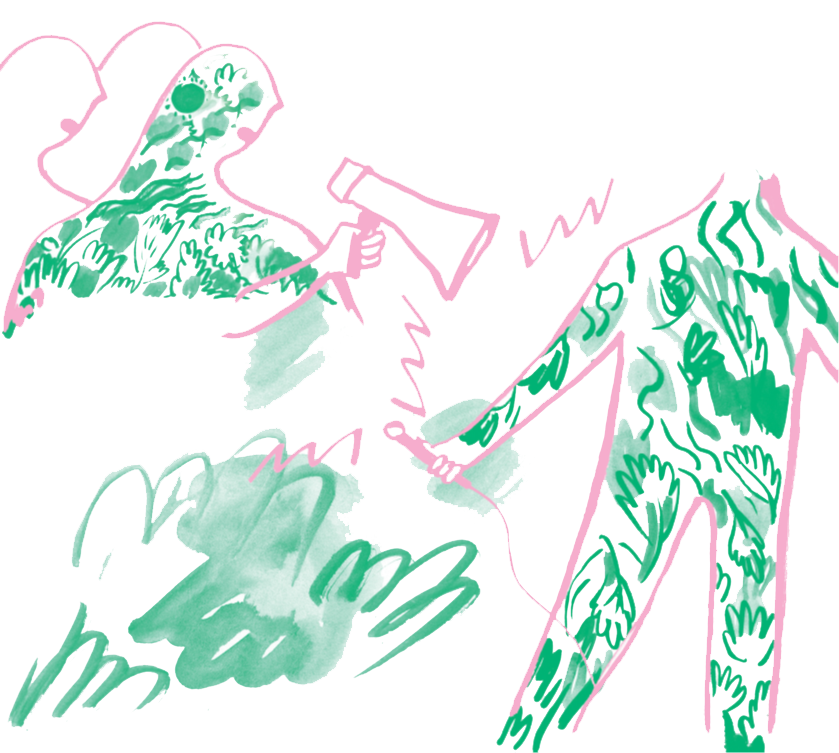Em 1970, já Neil Young clamava “look at Mother Nature on the run in the 1970s”. Passaram-se 50 anos desde o lançamento da canção After the Gold Rush e não ficaremos a dever nada à verdade se dissermos que a urgência em combater as alterações climáticas aumentou em mais de 50 vezes. Mas se há meio século eram solitárias as vozes que se levantavam pelo clima, hoje o coro – que inclui artistas como Foals, The 1975, Billie Eilish ou Grimes – já não deixa ninguém indiferente. A indústria da música está, cada vez mais, a juntar-se à luta pelo presente e futuro do planeta, e a mostrar que comportamentos e medidas inovadoras a sociedade pode pôr em prática.
Não é preciso ir muito longe para encontrar um caso pioneiro, citado internacionalmente como um exemplo a seguir. Há 18 anos que os organizadores do festival português Boom, em Idanha-a-Nova, fazem da sustentabilidade ambiental um dos seus pilares. Em 2002, ofereceram cinzeiros de bolso à porta do festival para acabar com as beatas no chão. Em 2006, delinearam um plano ambiental do qual já faziam parte as casas de banho compostáveis (que não recorrem a água ou químicos e geram composto para enriquecer o solo), o transporte colectivo e a bioconstrução do recinto (técnica de construção arquitectónica em que se utiliza materiais naturais, como o bambu).
“Nós fazemos um programa ambiental não para minimizar o impacto, mas para criar um impacto positivo. As medidas que criamos têm como objectivo deixar o local melhor do que quando lá chegamos”, explica Artur Mendes, membro da organização do festival.
O Boom já erradicou todo o plástico descartável e faz um uso consciente dos materiais não-biológicos. “Se nós estamos a introduzir alguns elementos que são sintéticos, tentamos que o seu ciclo de vida seja o mais extenso possível. Ou seja, se temos uma cobertura em poliéster, que também é baseado em petróleo, ela tem de durar pelo menos cinco edições.”
Na próxima edição, que acontece entre 28 de Julho e 4 de Agosto deste ano, dão mais um passo em frente: 85% da alimentação vai ser vegetariana e/ou vegan e vai manter-se a aposta em fornecedores locais, produtos orgânicos e marcas de comércio justo. Uma das novidades é uma parceria especial com uma marca espanhola que fornece água enlatada. “Após fazer uma venda de água, a empresa, juntamente com as organizações dos festivais, faz sempre uma acção cívica”, revela Artur Mendes. Este ano está prevista a limpeza da Barragem Marechal Carmona, em Idanha-a-Nova. Depois, no Inverno, é a vez de pôr em prática as acções anuais de reflorestação levadas a cabo pela equipa do festival.
Para Artur, os maiores obstáculos à produção de um evento inteiramente verde estão relacionados com a água e a energia. “Temos energia fotovoltaica e trabalhamos com geradores à base de diesel muito eficientes. Mas não temos recursos para criar um festival 100% solar”, nota o responsável. “Outra área sensível é a situação da água. Nós trabalhamos com uma barragem e vemos o quão difícil é a gestão hídrica em territórios onde estão a começar a introduzir agricultura intensiva. Por isso, trazemos tecnologia de retenção, temos jardins que utilizam muito pouca água e cortamo-la em algumas horas do festival de forma a racionalizar o consumo.”

Numa escala menor, também o Bons Sons, em Cem Soldos (Tomar), faz parte da reforma ecológica em Portugal. “O respeito tanto pelas pessoas como pelo ambiente que nos circunda é uma bandeira nossa”, afirma Miguel Atalaia, director artístico do festival. “Com 35 mil pessoas dentro de um recinto que é uma aldeia, evidentemente que se sente o impacto ambiental. Foi necessário optimizar equipas para que este impacto fosse cada vez mais reduzido, na lógica da preservação da aldeia e do ambiente”, acrescenta. Depois de verem, edição após edição, as ruas de Cem Soldos submersas em copos de plástico, introduziram, em 2012, a caneca metálica. Hoje, oferecem um copo de plástico reutilizável a cada visitante, de forma a erradicar a 100% os descartáveis.
Há três anos, instalaram torneiras redutoras de caudal, casas de banho compostáveis e prepararam actividades educativas de sensibilização ambiental dirigidas aos mais novos. Em 2018, investiram em iluminação LED, apresentaram loiça biodegradável e comestível e introduziram urinóis-fardo de palha – os resíduos resultantes das WC ecológicas, em conjunto com os fardos de palha, foram transformados em matéria orgânica fértil que a população pôde utilizar nas suas hortas. Em 2019, extinguiram oficialmente o plástico descartável da restauração. 2020 é ano de consolidar e reforçar estas medidas.

Laboratórios vivos de alternativas verdes
Curiosamente, foi no mesmo ano em que o Boom traçou o seu primeiro grande plano ambiental e em que o Bons Sons nasceu que Claire O’Neill co-fundou um dos mais relevantes projectos pró-ambiente dentro da indústria da música: A Greener Festival (AGF), uma organização sem fins lucrativos que se dedica a reduzir a pegada ambiental de festivais e outros eventos. Desde 2006, muito mudou.
“Agora quase todos os festivais têm um sustainability manager e uma política de sustentabilidade. Nos últimos dois anos houve um grande pico na acção pelo ambiente”, assegura Claire O’Neill. “Toda a gente está a começar a perceber que estamos muito perto de um deadline.”
Para estimular a acção, a AGF dedica-se à consultoria – ajudando cada festival, por exemplo, a delinear uma estratégia de modo a reduzir a quantidade de resíduos e melhorar a eficiência energética – e à certificação internacional, com o The Green Festival Award. “A certificação envolve um processo de autoavaliação e uma visita de peritos ao festival. No fim do evento, são-nos enviados os dados, nós damos recomendações de melhorias e atribuímos uma nota, de improvers a outstanding.” Sem surpresas, o Boom obtém a classificação máxima desde 2014.
Lá fora também há bons exemplos a seguir. No Paradise City, na Bélgica, substituíram as garrafas por um sistema portátil de filtração de água, criado pela empresa Bosaq, que converte qualquer tipo de água em água potável, recorrendo apenas à energia solar. No DGTL, na Holanda, criou-se o Semilla Sanitation Hub, um centro de saneamento em que é possível converter urina em água potável. O Shambala, em Inglaterra, é alimentado a 100% por energias renováveis. O We Love Green, em França, já plantou 80.000 árvores e, em 2019, distribuiu 2.600 refeições por instituições de caridade, evitando o desperdício de toneladas de comida.
Provas que confirmam a tese de Claire, que acredita que os festivais podem ser laboratórios vivos, uma montra de soluções alternativas que podem ser adaptadas a outras áreas. E os governos podem (e devem) ter mão nessa mudança, sublinha, “apoiando tecnologias limpas e sustentáveis, em vez de investir na indústria dos combustíveis fósseis, dos quais a nossa sociedade – e, por consequência, a indústria musical – ainda é dependente.”
Artivistas
Pressionar os governos a implementar políticas vinculativas no que toca ao clima é a principal meta de Fay Milton para 2020. A baterista da banda Savages é uma das impulsionadoras do colectivo Music Declares Emergency (MDE), inspirado pelo movimento Extinction Rebellion e pela organização londrina Julie’s Bicycle. Em Julho de 2019, o MDE apresentou-se ao mundo como “um grupo de artistas, profissionais da indústria musical e organizações que se unem para declarar emergência climática e ecológica e alertar para uma resposta imediata, por parte dos governos, para a protecção da vida na Terra” – um manifesto que contou, de imediato, com subscritores de peso como os Radiohead, Pretenders e Jarvis Cocker, e editoras e empresas como a Sub Pop, Virgin EMI e Sony Music UK. Mais de 1.300 artistas e 700 entidades assinaram-no desde então.
Fay despertou para a problemática ambiental há cinco anos, quando mergulhou no livro This Changes Everything: Capitalism vs. The Climate, da escritora e activista social Naomi Klein. “Foi uma wake up call para entender a urgência do tema. Fiquei muito alerta, mas sentia que não existia um movimento do qual pudesse fazer parte dentro da indústria musical. Parecia que as pessoas ainda não tinham entendido a dimensão do problema.”
Apercebeu-se, depois, de que não era a única com vontade de fazer a diferença. Por causa das tours, muitos músicos sentiam-se culpados por contribuírem para o aumento das emissões de carbono com as suas intensas rotinas de voos, e também pelas toneladas de plástico que dominavam os locais onde actuavam. “Havia uma desconexão entre a indústria musical e o movimento climático por causa deste sentimento: ‘mas eu voo muito, será que posso fazer parte deste movimento?’. A resposta é ‘sim, absolutamente sim’”, argumenta a baterista das Savages. “Os fãs de música também viajam muito. No ano passado, cerca de 1 milhão de pessoas visitou o Reino Unido para ir a concertos e festivais. Portanto, se os artistas não viajarem até aos seus fãs, os fãs viajam até eles.” Os dados batem certo. Segundo a Green Touring Network, que disponibiliza gratuitamente um guia para tornar as digressões mais verdes, 34% da pegada de carbono de uma tour é causada pelos recintos, 33% pelas viagens do público, 12% pelo merchandise vendido, 10% pelas estadias, 9% pelas viagens da banda e 2% pela promoção do evento.
“A acção individual é positiva, mas a diferença só pode mesmo ser feita se os governos assumirem a responsabilidade pelos seus actos e legislarem”, reforça a artista, que já está de olhos postos em Novembro, altura em que se realizará a Conferência sobre Mudança Climática das Nações Unidas 2020, em Glasgow.
“Temos boa parte deste ano para pressionar os nossos líderes e fazê-los perceber que é essencial agir com urgência. E os artistas podem ajudar nisto, promovendo estas ideias. É que toda a gente adora música, mas nem toda a gente adora política. Especialmente em 2020.”
No que diz respeito à questão do greenwashing, ou capitalismo verde, na indústria musical (ou seja, a apropriação das lutas ambientalistas pelas grandes empresas), tanto Fay Milton como Claire O’Neill admitem que possa ser uma tendência no futuro – “se virem um evento dedicado ao clima patrocinado por uma companhia aérea, é claro que os alarmes têm de soar”, diz a primeira –, mas ambas acreditam que esse é, neste momento, um problema menor. “Tenho visto mais greenhush do que greenwash”, diz a directora da AGF, referindo-se à comunicação selectiva ou omissão de medidas sustentáveis que estão a ser postas em prática.
Para os músicos que queiram juntar-se à causa, Fay deixa sugestões como “pressionar os responsáveis pelas salas e pelos festivais onde actuam a livrarem-se dos plásticos descartáveis e a encontrarem alternativas”, “repensar as tours”, minimizando as distâncias percorridas e viajar de comboio, em vez de avião, sempre que possível, e “reinventar o merchandise”, deixando de lado os artigos de moda, pois “a indústria da moda é extremamente poluente”.
Há quem já tenha posto as mãos na massa: os Massive Attack começaram a colaborar com a Universidade de Manchester para mapear a pegada de carbono das suas digressões e trabalhar num projecto para reformar a indústria. Já os Radiohead, no Verão do ano passado, doaram ao Extinction Rebellion a totalidade das receitas das vendas do material inédito das sessões de gravação de OK Computer.

Sustentabilidade digital
Também há editoras que estão a começar a repensar o seu modus operandi. A britânica Ninja Tune, por exemplo, passou a usar vinil de 140g em vez de 180g e cortou com as caixas de CD de plástico mais comuns (as jewel cases), que são feitas à base de um material não-reciclável. “Não parece uma mudança muito grande, mas representa uma redução drástica nas emissões de carbono”, assinala a baterista das Savages. A pequena editora inglesa Tesla Tapes vai mais longe: 10% de todas as vendas físicas e digitais é redireccionado para um projecto de reflorestação. Paddy Shine, músico dos Gnod e homem por trás desta editora, diz-nos ainda que “usar materiais reciclados ou reutilizáveis para tudo” é uma das medidas sustentáveis que as editoras podem adoptar. E traz outra questão importante para cima da mesa: o impacto ambiental do streaming.
“Um CD, uma cassete ou um vinil vão ser ouvidos inúmeras vezes e podem durar uma vida. Se as edições forem poucas e todos os exemplares forem vendidos, até pode ser sustentável. O streaming é uma besta diferente, nunca acaba.”
Ao contrário do que muitos pensam, o consumo digital de música não é uma alternativa 100% verde. Apesar de a quantidade de plástico utilizada para produzir álbuns físicos ter caído, nos EUA, de 61 milhões de quilogramas em 2000 para 8 milhões de quilogramas em 2016, um estudo da Universidade de Oslo em parceria com a Universidade de Glasgow, chamado The Cost of Music, revelou recentemente que a energia necessária para pôr a funcionar as plataformas de streaming de música fez com que a emissão de gases de efeito estufa subisse consideravelmente – hoje, a quantidade destes gases gerada pelo streaming está entre os 200 e 350 milhões de quilogramas. Contudo, o objectivo não é entrar numa cruzada anti-streaming: como afirmou o autor do estudo, Kyle Devine, à Rolling Stone, trata-se de “um simples exercício de transparência e responsabilidade”. Um exercício importante, já que poderá servir para pressionar as grandes empresas de streaming a dar novos passos nas suas políticas de sustentabilidade.
Passaram-se 50 anos desde o hino ecologista de Neil Young, dizíamos, e hoje, mais do que nunca, faz sentido cantar “look at Mother Nature on the run”. O tempo está a esgotar-se.
English Version
“No music on a dead planet”: the music industry’s fight against climate change
In 1970, Neil Young cried out “look at Mother Nature on the run in the 1970s”. Fifty years have elapsed since the song After the Gold Rush was released and to be quite frank, the urgency to combat climate change is at least 50 times higher. But while half a century ago, only a few voices would speak up for the climate, today, the choir – which includes artists such as Foals, The 1975, Billie Eilish or Grimes – no longer leaves anyone indifferent. Increasingly, the music industry is joining the fight to protect planet’s present and future and shows which attitude and innovative actions can be put in practice by society.
We don’t need to go very far to find a forerunner, internationally recognised as an example to be followed. It’s been 18 years that the organisers of Boom, a Portuguese festival in Idanha-a-Nova, have identified sustainable development as one of their pillars. In 2002, they provided portable ashtrays at the festival entrance to put an end to discarded cigarettes butts. In 2006, they laid out an environmental plan which already included composting toilets (i.e., toilets that don’t rely on water or chemicals and that generates compost to nurture the soils), collective transport solutions and the bio-construction of the festival, a temporary architectural building technique which uses natural materials such as bamboo wood.
“The objective of our environmental-friendly program isn’t to reduce our impact but rather to make a positive one. The measures we develop aim at improving the area in which we operate”, explains Artur Mendes, organising member of the festival.
The Boom festival has already eradicated all single-use plastics and makes a conscious use of non-organic materials. “If we introduce synthetic elements, we strive to extend their life cycle as much as possible. For example, if we have a polyester cover, which is also oil-based, it has to last for at least five editions.”
For the next edition, which is to take place between the 28th of July and the 4th of August of this year, they go another step further: 85% of food will be vegetarian and/or vegan and they will keep their commitment towards local providers, organic products and fair-trade brands. One of the novelties is a special partnership with a Spanish brand that provides canned water. “When they make a sale, the company, in collaboration with the festival’s organising bodies, always carry out a civic action”, adds Artur Mendes. This year, they have planned to clean the Marechal Carmona dam, in Idanha-a-Nova. Then, during winter, the yearly reforestation projects carried out by the festival’s team will be implemented.
For Artur, the main hurdles to the organisation of an entirely green event have to do with water and energy. “We’ve got photovoltaic energy and we work with very efficient diesel-based generators. However, we don’t have the means to create a festival 100% powered with solar energy”, notes the organiser. “Another sensitive issue is the water situation. We work with a dam and we realise how difficult it is to manage water resources in areas where they are starting to introduce intensive agriculture. That’s the reason why we are bringing retention technologies, we’ve got gardens that need very little water and we cut water supply off for a few hours during the festival, in order to streamline consumption.”

To a lesser extent, the Bons Sons festival, in Cem Soldos (Tomar), is part of the ecological reform in Portugal. “Respect for people and the environment that surrounds us is part of our DNA”, says Miguel Atalaia, artistic director of the festival. “With 35,000 people gathered in a location that is a village, you can obviously feel the impact on the environment. We had to optimise our teams to keep reducing this impact, with the protection of the village and the environment in mind”, she adds. When they saw that, after each edition, the streets of Cem Soldos were filled with plastic cups, they introduced, in 2012, metal mugs. Today, they offer reusable plastic cups to each visitor, in order to eradicate 100% single-use products.
Three years ago, they installed water flow restrictors, composting toilets and organised activities to educate the youth on environmental issues. In 2018, they invested in DEL lighting, offered biodegradable and edible tableware and introduced hay bale-urinals – the waste generated by the ecological toilets, together with the hay bales, were turned into fertile organic matter that the population could use in their gardens. In 2019, they officially withdrew single-use plastics from catering activities. In 2020, these measures will need to be consolidated and strengthened.

Living Laboratories for Green Alternatives
Strangely enough, the Boom festival laid down its first environmental plan and the Bons Sons festival was created in the same year in which Claire O’Neill co-founded one of the most relevant pro-environmental projects in the music industry: A Greener Festival (AGF), a non-profit organisation committed to reducing festival’s and other events’ environmental footprint. Since 2006, many things have changed.
“Now almost all festivals have a sustainability manager and a sustainable development policy. Over the last two years, the number of green initiatives has surged”, argues Claire O’Neill. “Everybody starts realising that we are very close to a deadline.”
To stimulate action, AGF acts as a consulting firm – for example, helping each festival developing a strategy aimed at reducing waste and improving energy efficiency – and as a body granting international certificates, such as the The Green Festival Award. “The certification process consists of a self-assessment and experts visiting the festival. At the end of the event, we receive the data, give recommendations for improvement and award a mark, from improvers to outstanding”. Unsurprisingly, the Boom festival has the highest rating since 2008.
Abroad, a number of good examples can also be emulated. At Paradise City, in Belgium, they got rid of bottled water thanks to a portable water filtration system, created by Bosaq, a company that converts any kind of water into drinkable water through solar energy only. At DGTL, in the Netherlands, the Semilla Sanitation Hub was created, a sanitation centre which manages to convert urine into drinkable water. In England, the Shambala festival is 100% powered by renewable energy. In France, the We Love Green festival has already planted 80,000 trees and in 2019, they have provided 2,600 meals to charities, avoiding tons of food waste.
These proofs support Claire’s assumption: festivals can act as living laboratories and exhibit alternative solutions which can be adapted to other areas. And the governments can (and must) take part in this change, she underlines, “supporting clean and sustainable technologies, instead of investing in the fossil fuel industry, on which our society – and subsequently, the music industry – still relies”.
Artivists
Lobbying governments to implement binding policies related to climate issues is Fay Milton’s main objective for 2020. The drummer of Savages, a music band, is one of the driving forces behind the Music Declares Emergency (MDE) collective, inspired by the Extinction Rebellion movement and the London-based organisation, Julie’s Bicycle. In July 2019, the MDE presented themselves to the world as “a group of artists and professionals of the music industry and organisations joining forces to declare a climate and ecological emergency and raise awareness on the need for an immediate response, from governments, to protect life on Earth” – a manifesto that was immediately signed by heavyweight subscribers, including Radiohead, Pretenders and Jarvis Cocker, as well as labels and music publishers such as Sub Pop, Virgin EMI and Sony Music UK. To this date, it has been signed by over 1,300 artists and 700 bodies.
Fay’s ecological wake-up call happened five years ago, when she immersed herself in This Changes Everything: Capitalism vs. The Climate, a book written by author and activist Naomi Klein. “It was a wake-up call that made me understand the urgency of the issue. I became very mindful, but I felt that there weren’t any movement in the music industry that I could join. It seemed to me that people hadn’t realised yet how big this problem was.”
Then, she realised that other people also wanted to make a difference. Because they are touring, many musicians felt guilty for contributing to the increase in carbon emissions with their intense flying routines, and also because of the tons of plastics polluting the venues where they perform. “The music industry and the climate movement were disconnected because of this feeling: ‘but I fly a lot, can I participate in this movement?’. The answer is “yes, of course you can”, argues the drummer of Savages. “Music fans also travel a lot. Last year, almost 1 million travellers flew to the United Kingdom to go to a concert or a festival. So, if artists don’t travel to their fans, fans will travel to them.” The data are right. According to the Green Touring Network, which offers a free guide for greener tours, 34% of a tour’s carbon footprint is caused by the venue, 33% by visitors’ travels, 12% by the sale of goods, 10% by stays, 9% by the bands’ travels and 2% by the event promotion.
“Individual action is a positive thing, but we can only make a difference if governments are held accountable and pass new laws”, underlines the artist, whose eyes are already set on the next UN Conference on Climate Change which is to be held in Glasgow in 2020.
“We’ve got a bit less than a year to put pressure on our leaders and make them understand that they need to act urgently. And artists can help by promoting these ideas. Indeed, everybody loves music, but few people love politics. Especially in 2020.”
About the issue of greenwashing, or green capitalism in the music industry (i.e., the appropriation of environmental movements by big companies), both Fay Milton and Claire O’Neill concede that it could be a trend in the future – “if you see an event on the climate issue sponsored by an airline company, obviously, you should be on your guard”, says Fay Milton –, but they both believe that, at the moment, this is a minor issue. “I’ve seen more greenhush than greenwash”, argues the head of AGF, referring to selective communication or the omission of measures implemented in the area of sustainability.
For musicians who want to join the fight, Fay makes some suggestions such as “pressuring the people managing the venue and the festivals were they perform to get rid of single-use plastics and look for alternatives”, “rethinking touring”, reducing distances and travelling by train, instead of airplanes, where possible, and “reinventing merchandizing”, avoiding fashion articles, as “the fashion industry is a big polluter”.
Some of them have already got their hands dirty: Massive Attack started a collaboration with the Manchester University to map the environmental footprint of their tours and work on a project aimed at reforming the industry. Last year, during the summer, Radiohead donated to Extinction Rebellion all the revenue generated from the sale of unreleased material from the recording sessions of OK Computer.

Digital Sustainability
Also, some record labels have started to rethink their modus operandi. For instance, Ninja Tune, a British label, reduced the weight of its vinyl records from 180g to 140g and eliminated the most common plastic CD cases (the jewel cases), which are made of a non-recyclable material. “It doesn’t seem like a massive change, but it does represent a significant reduction in carbon emissions”, says Fay Milton. Tesla Tapes, a small label, takes a step further: 10% of all direct and digital sells are reallocated to a reforestation project. Paddy Shine, musician of Gnod and the man behind this label, further comments that “using recycled or reusable material for everything” is one the sustainable measures the record companies can take. And he also brings another important issue to the table: the environmental impact of the streaming technology.
“A CD, a tape or a vinyl record are going to be heard time and time again and can last a lifetime. If there were only a few editions and all copies were sold, it could be sustainable. The streaming technology is an entirely different beast, it never ends.”
Contrary to common belief, the digital consumption of music isn’t a 100% green alternative. Although the plastic volumes used to produce physical albums have plummeted, in the US, from 61 million kilograms in 2000 to 8 million kilograms in 2016, a study carried out by the Oslo University in partnership with the Glasgow University, entitled The Cost of Music, has recently shown that the energy needed to power streaming music platforms has contributed to the significant increase in greenhouse gases emissions – today the amount of gases generated by the streaming platforms stands between 200 and 350 million kilograms. Nevertheless, the objective isn’t to go to war against the streaming industry: as the author of the study, Kyle Devine, said to Rolling Stone, the study is just “a transparency and accountability exercise”. An important one though, as it could be used to pressurise the big streaming companies into taking their sustainability policies a step further.
As we said, 50 years have elapsed since Neil Young’s pro-environment anthem and today, singing “look at Mother Nature on the run” is more relevant than ever. Time is running out.
/ Translation by Saoussen Khalifa



